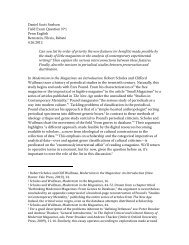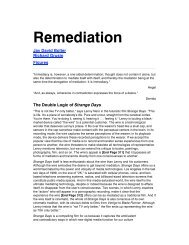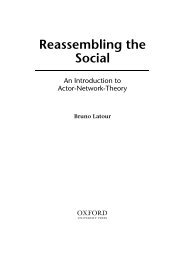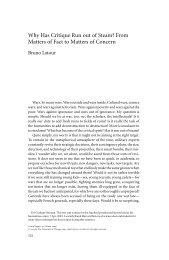The Exploit: A Theory of Networks - asounder
The Exploit: A Theory of Networks - asounder
The Exploit: A Theory of Networks - asounder
Create successful ePaper yourself
Turn your PDF publications into a flip-book with our unique Google optimized e-Paper software.
126 Edges<br />
the so - called closed logics <strong>of</strong> state and commercial control operate<br />
primarily using a social model <strong>of</strong> control. For example, Micros<strong>of</strong>t’s<br />
commercial prowess is renewed via the social activity <strong>of</strong> market exchange.<br />
Or digital rights management (DRM) licenses establish a<br />
social relationship between producers and consumers, a social relationship<br />
backed up by specific legal realities (such as the 1998 Digital<br />
Millennium Copyright Act).<br />
From this perspective, we find it self - evident that informatic (or<br />
material) control is equally powerful as, if not more so than, social<br />
control. If the topic at hand is one <strong>of</strong> control, then the monikers <strong>of</strong><br />
“open” and “closed” simply further confuse the issue. Instead we would<br />
like to speak in terms <strong>of</strong> alternatives <strong>of</strong> control whereby the controlling<br />
logic <strong>of</strong> both “open” and “closed” systems is brought out into the<br />
light <strong>of</strong> day.<br />
A Google Search for My Body<br />
<strong>The</strong> expectation is that one is either online or not. <strong>The</strong>re is little<br />
room for kind <strong>of</strong> online or sort <strong>of</strong> online. Network status doesn’t allow<br />
for technical ambiguity, only a selection box <strong>of</strong> discrete states. It is<br />
frustrating, ambiguity is, especially from a technical point <strong>of</strong> view. It<br />
works or it doesn’t, and when it doesn’t, it should be debugged or<br />
replaced. To be online in a chronically ambiguous state is maddening,<br />
both for those communicating and for the service provider. <strong>The</strong><br />
advent <strong>of</strong> broadband connectivity only exacerbates the problem, as<br />
expectations for uninterrupted uptime become more and more inflexible.<br />
One way to fix the ambiguity is to be “always on,” even when<br />
asleep, in the bathroom, or unconscious. All the <strong>of</strong>ficial discourses <strong>of</strong><br />
the Web demand that one is either online and accounted for, or <strong>of</strong>fline<br />
and still accounted for. (This is the idealistic ubiquity <strong>of</strong> wireless connectivity—the<br />
very air you breathe is a domain <strong>of</strong> access, harkening<br />
back to radio’s domain <strong>of</strong> dead voices on air.) Search engines are the<br />
best indicator <strong>of</strong> this demand. Bots run day and night, a swarm <strong>of</strong> surveillance<br />
drones, calling roll in every hidden corner <strong>of</strong> the Web. All<br />
are accounted for, even those who record few user hits. Even as the<br />
Web disappears, the networks still multiply (text messaging, multi-









